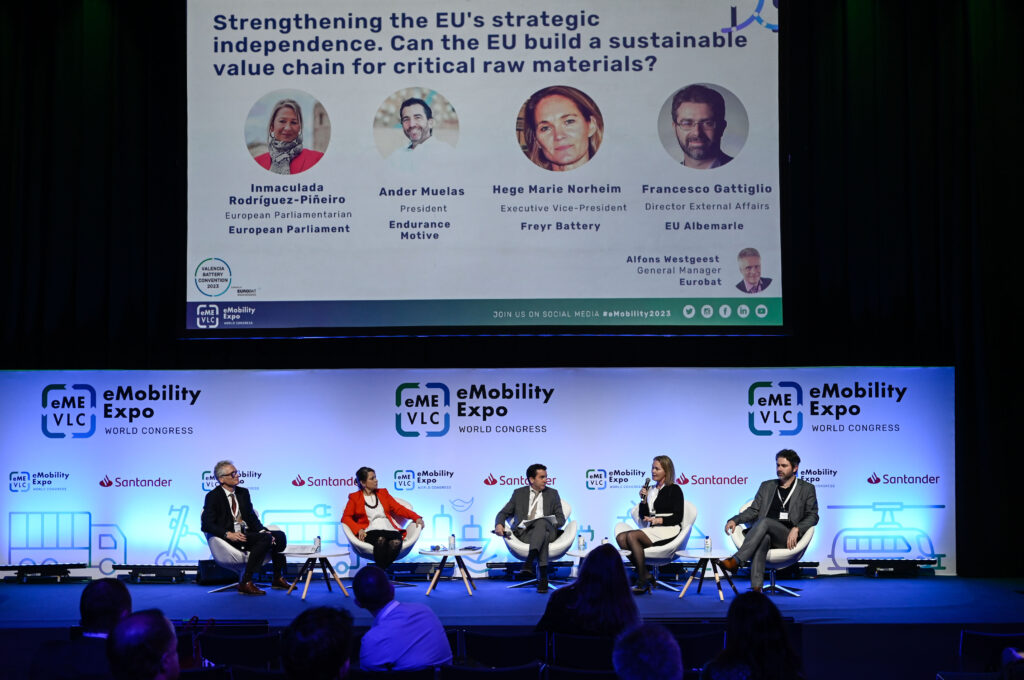Valencia Battery Convention showcases batteries as a key technology for Europe’s clean energy future, but emphasises the need for a regulatory framework that supports investment, innovation and access to critical raw materials

The event, part of the eMobility Expo World Congress, brought together over 350 key stakeholders from the EU battery landscape to debate the Batteries Regulation and the green transition, critical raw materials and the future of mobility and energy storage.
On 23 March, EUROBAT, the Association of European Automotive and Industrial Battery Manufacturers, welcomed over 350 key stakeholders from the EU battery landscape to the Valencia Battery Convention to discuss key issues at a critical time for the battery industry, including the evolving regulatory framework in the EU, the EU’s strategic independence in relation to critical raw materials and innovating the future of mobility and energy storage.
Opening the Convention, Ximo Puig, President of the Valencian region, spoke about the Valencian region as a European hub for sustainable mobility and celebrated the choice of Valencia for the event. He said:
“This forum is useful, necessary, essential. It amplifies our strengths as a land of investments, makes our advances in mobility visible and places us as a forum for debate in this industry in transformation.”
The Batteries Regulation and the evolving regulatory framework in the EU. Is the EU ready for the green transition?
The first session with Thomas Dahlem (CEO, PowerCo Spain), René Schroeder (Executive Director, EUROBAT), César Santos Gil (Policy Officer leading the Batteries Regulation, European Commission), Kamila Slupek (Sustainability Director, Eurometaux) and Liu Ziyu (Deputy Director of Governmental Affairs, CATL), presented the Sagunto battery gigafactory in Valencia and discussed the Batteries Regulation as a key part of the European Green Deal that sets a high standard, but there is also a need for a long-term vision and holistic regulatory framework to ensure investment in European battery manufacturing and sustainable access to strategic and critical raw materials.
Strengthening the EU's strategic independence. Can the EU build a sustainable value chain for critical raw materials?
The second session with Inmaculada Rodríguez-Piñero (MEP), Ander Muelas (President, Endurance Motive), Hege Marie Norheim (Executive Vice-President, Freyr Battery) and Francesco Gattiglio (Director External Affairs, EU, Albemarle) discussed how sustainability could be a competitive advantage for the EU. However, to secure a sustainable value chain for critical raw materials, there needs to be a clear and predictable regulatory environment, public and private collaboration, new business models to manage resource scarcity and the utilisation of the EU’s talent, innovation, principles and values.
The session also featured a video presentation from Manuel Szapiro (Head of the European Commission Representation in Barcelona) on the European Battery Alliance and the role of the European Commission in identifying batteries as a strategic sector for competitive sustainability in 2017.
Electric Dreams: Innovating the Future of Mobility and Energy Storage
The final session with Rebeca Torró (Consellera de Transportes, Generalitat), David Salvo (CEO, Power Electronics), Fernando Acebrón (Director of Institutional Relations and Government Affairs, Ford Spain) and Leire Zubizarreta (R&D Project Manager, ITE) looked at how Valencia can be a benchmark in innovative energy storage and a central hub for sustainable mobility and energy. The discussion emphasised the importance of a reliable regulatory framework that boosts innovation and investment, the need for leadership in developing innovative solutions, the importance of public-private partnerships that are supported by research institutes and the need for policy-makers to work closely with industry.
Batteries are a key technology for tackling decarbonisation
The Convention was closed by Diana Morant, Spanish Minister of Science and Innovation, who said:
“Valencia is the perfect city for talking about creativity, innovation and energy. Batteries are a key technology to meet the European challenge of decarbonisation and clean energy. We still have time to ensure a livable future for the next generations, but we must continue with greater determination and courage on the path we have already started together.”
Pau Sanchis, Senior Policy Manager at EUROBAT, said:
“We were very happy to welcome around 350 key stakeholders to the Valencia Battery Convention. This exemplifies how Valencia is attracting businesses and is set to be a hub for sustainable energy and mobility. This is very timely as the Batteries Regulation is about to be finalised and new legislation and actions are coming from the European institutions. Batteries are well-established as key enablers of the green transition and the European battery industry is gaining momentum. With the right regulatory framework, companies are clearly willing to invest in our clean energy future.”
About the eMobility Expo World Congress

The Valencia Battery Convention took place within the framework of the eMobility Expo World Congress. The eMobility Expo World Congress is the global professional event for the sustainable mobility industry. The first edition of the event took place from 21 to 23 March and welcomed more than 5,794 visitors from 16 countries. Along with industry professionals, 344 world experts participated in the congress and 179 international companies, such as Ford, Toyota, Iberdrola, Cepsa, Balearia, Air Nostrum, Power Electronics, BP, and Ficosa, among others, presented their latest innovations in sustainable mobility during the event.
Media contact:
Gert Meylemans, Director Communications and Stewardship:
gert.meylemans@eurobat.org +32 475565661
About EUROBAT:
EUROBAT is the leading association for European automotive and industrial battery manufacturers, covering all battery technologies, and has more than 50 members. The members and staff work with all policymakers, industry stakeholders, NGOs and media to highlight the important role batteries play for decarbonised mobility and energy systems as well as all other numerous applications.